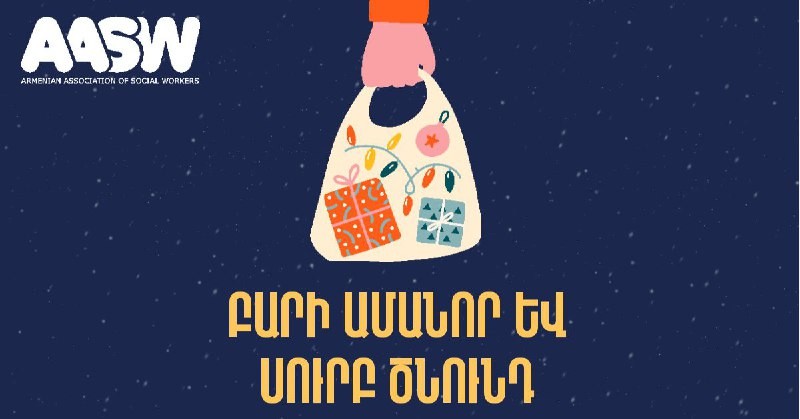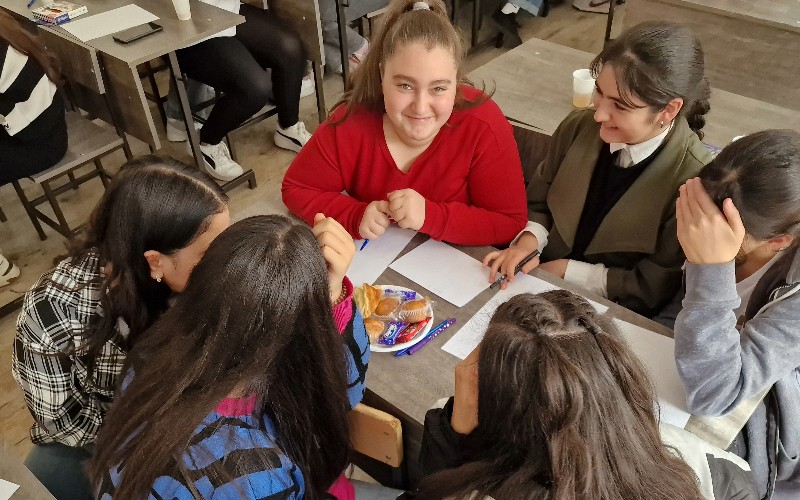Call for Applications – Design of Social Rehabilitation Service Model
26.05.2025
Armenian Association of Social Workers is inviting potential suppliers to participate in Design of Social Rehabilitation Service Model Open Tender AASW-RISE-005/25 in the frames of "RISE Armenia: Rehabilitation, social inclusion and empowerment of the displaced and vulnerable population" project.
Positions:
- Social Rehabilitation Service Model Design Expert
- Social Rehabilitation Service Model Cost-Estimation Expert
Start Date: June 15, 2025
End Date: September 30, 2025
Location: Shirak Region, Maralik Community
Project title: RISE – Armenia: Rehabilitation, Social Inclusion and Empowerment of the Displaced and Vulnerable Population
Project objective: Improve the social protection systems for vulnerable people, specifically refugees from Nagorno-Karabakh, in Armenia, with a focus on enhancing the quality of local social workforce and ensuring the availability and accessibility of relevant social care and socio-rehabilitation services.
Project location: Aragatsotn, Tavush, Gegharkunik, and Shirak Regions of Armenia
- Background and Context:
About the Project: The EU-funded project “RISE – Armenia: Rehabilitation, Social Inclusion, and Empowerment of the Displaced and Vulnerable Population” (hereafter referred to as the Project) is a joint initiative led by World Vision Armenia (WVA) and implemented together with the Armenian Association of Social Workers (AASW) and People in Need (PIN).
The Project seeks to empower vulnerable population through the development of innovative social services, specifically targeting refugees from NK across Armenia’s regions across the four regions of Armenia (Aragatsotn, Gegharkunik, Shirak, and Tavush).
2,000-2,100 most vulnerable population, including refugees from NK, will directly benefit from the Action activities through targeted social work and enhanced opportunities for income generation, as well as through sub-granting component.
Focus of the ToR: The project goals are in line with the newly adopted law on Social Assistance in Armenia (October 2024), which mandates the development of services that will aid vulnerable populations in gaining better access to social support and integration.
This Terms of Reference (ToR) describes the scope of activities within the framework of the “RISE-Armenia” Project, with an aim to design a new social rehabilitation service model based on the Maralik Social House setting.
The service model should describe the professional skills of the personnel engaged in the service provision and involve the necessary modules for the training of the service staff.
The Maralik Social House currently accommodates 161 individuals, housed within 89 social apartments, each consisting of a room, bathroom, and kitchen. Of these residents, 45 individuals are refugees from NK. The residents, including elderly and single individuals, families of children with disabilities, individuals with mental health issues, face a lack of essential community-based care services and adequate living conditions, which in turn often leads to disruptive behaviors and tensions within the community. The majority of residents currently face unemployment, social isolation and discrimination, exclusion from health and social services, and inadequate living conditions.
- Objective of the Assignment:
The main objective of this Terms of Reference (ToR) is to design a Community-Based Social Rehabilitation Service Model, aimed to facilitate the social integration and social inclusion, resilience, self-reliance and community engagement among the residents of Maralik Social House, with a specific focus on refugees from Nagorno-Karabakh (NK).
The designed model should incorporate the following key features:
- Address the specific needs of residents, including stigma reduction, improved social performance, enhanced social cohesion, and community integration,
- Include components such as MHPSS, homecare, vocational support, residential assistance, recreational activities, employment opportunities and other elements that promote well-being and independence,
- Propose inter-disciplinary and inter-agency operation model, based on the existing social protection, health and education, as well as any other relevant systems in Armenia,
- Be adaptable and replicable for implementation in other Social Housing Settings across Armenia.
- Scope of Work
Under this Terms of Reference, the Expert should be responsible for the following tasks:
- Assessment of the Specific Needs and Resources of the Maralik Social House’s Residents: To ensure an evidence-based and beneficiary-centered design of the service, the Expert should be responsible to identify the social, psychological, health, care, economic and integration-related needs and resources of the residents, with a particular emphasis on refuges from NK. A Need Assessment Report, should be prepared, including prioritization of essential common needs and identified resources, which will guide the design of service. Specifically, under this task, the Expert should conduct at least the following activities:
- Profiling the Residents to explore individual and family-level challenges and strengths, at least including elements, such as demographic characteristics, including social groups, family history, trauma experience, social needs, abilities, and other elements essential for the design of the Service Model.
- Conducting Focus Group Discussions with the residents to identify community-level challenges and strengths, as well as the perceptions of residents related to their environment.
- Key-Informant Interviews with the relevant experts and stakeholders to identify the policy and practice priorities in regards to the specifics of service.
- Analysis of the International and Local Social Rehabilitation Service Models: To analyze the best practices and lessons learned from international and local experiences, with an aim to identify the most relevant components for the context of Maralik Social House. Under this task, the Expert should conduct at least the following activities:
- Desk Review and Comparative Analysis of international best practices, which are in line with international laws and social rights, as well as applicable practices (considering cultural, institutional, and economic factors) for the implementation in Armenian realities, and in the context of Maralik Social house. The analysis should provide insights in regard to the key parameters of services, such as target population, service components, implementation mechanisms, outcomes, and scalability.
- Design of Social Rehabilitation Service Model: To develop a comprehensive social rehabilitation service model based on the identified needs and resources of the Maralik Social House residents, as well as the best practices and lessons learned from international and local practices: The designed model should include components related to operational, methodological, and administrative aspects of the service. Specifically:
- Description of the Service, including vision, mission, goals and objectives, as well as scope and main components of the support (MHPSS, homecare, vocational training, community reintegration, employment, mechanisms for transition planning (e.g., moving into independent housing, accessing community-based employment or health services) and follow-up support ), eligibility criteria for service provision, personnel (including job descriptions, competencies and qualifications)
- Methodology and Toolkit, including intervention strategies (case work, group activities, community engagement, etc.), tools for screening, assessment, planning, intervention, and monitoring.
- Standard Operational Manual, including step-by-step procedures for the service delivery from intake of beneficiaries to exit (including follow-up), as well as roles and responsibilities of team members, partnership strategies with other community and state agencies, and cooperation approaches with beneficiary’s family members, and other significant individuals in the beneficiary’s life.
- Internal Rules, including rules for administrative and managerial operation of the service in line with the legal regulations. In addition, it should at least cover areas, such as residents’ participation, confidentiality, data protection, complaint and grievance redress mechanisms, beneficiary safeguarding, inclusive, rights-based, gender-sensitive and culturally competent service provision.
- Service Quality Standards, covering at least the following criteria: Management and Administration, Personnel and Professional Development, Service Provision, Beneficiary Participation and Engagement, Community Participation and Partnership, Monitoring and Evaluation, Sustainability, Safety.
- Competency Framework of the Personnel engaged in the service provision,
- Training Modules for the professional staff members.
- Cost Estimation, which includes calculation of estimated annual and per-beneficiary costs.
- Presentation of the designed model in discussions and verification workshops to present the results of conducted assessments and Analysis, as well as the developed model for Social Rehabilitation Service.
4. Deliverables:
- Need Assessment Report - A detailed outline of the methodology, prioritized needs and identified resources of the Maralik Social House’s Residents, based on the profiling of service users and focus group discussions.
- Comparative Analysis Report on the International and Local Social Rehabilitation Service Models - A comprehensive analysis of the best practices and lessons learned from international and local experiences, including recommendations applicable to the local realities.
- Design of Social Rehabilitation Service Model - A structured document, including at least the following components: Description of the Service, Methodology and Toolkit, Standard Operational Manual, Internal Rules, Service Quality Standards, professional skills description of the main staff of the services., and modules of the trainings for the professional staff members.
- Cost Estimation of the Social Rehabilitation Service Model – detailed cost-estimation of the service design, including establishment and operational financial costs annually and per beneficiary.
- Final Report: A comprehensive report summarizing the design process, challenges, outcomes, and recommendations for future implementation.
5. Qualifications and Experience:
The ideal candidate for this consultancy should have the following qualifications and experience:
Education and Qualifications:
- Social Rehabilitation Service Model Design Expert:
-
- Education: At least master’s degree in Social work, Social Services, Mental Health, Human Rights, Law or a related field.
- Experience: At least 5 years of experience in designing and piloting social service models, particularly in the areas of social rehabilitation, social care, employment support and/or community development.
- Strong familiarity with the national legislation in social protection field, including the recently adopted Law on Social Assistance (October 2024) and its implications for social service design.
- Previous experience working with vulnerable populations in Armenia or similar contexts, particularly in rural and remote areas.
- Social Rehabilitation Service Model Cost-Estimation Expert:
- Education: At least master’s degree in economics, or a related field.
- Experience: At least 5 years of experience in financial estimation of social service models, particularly in the areas of social rehabilitation, social care, employment support and/or community development.
- Strong familiarity with the national legislation in social protection field, including the social service standards and its implications for social service cost estimation.
- Previous experience working with vulnerable populations in Armenia or similar contexts, particularly in rural and remote areas.
- Skills:
- Excellent written and oral communication skills in Armenian and/or English.
- Strong analytical and problem-solving abilities.
- Skills in developing social services’ models and toolkits of the social services.
- Reporting and Supervision
The Social Rehabilitation Service Model Design Expert will report directly to the Project Manager, AASW and will work closely with local partners and stakeholders throughout the assignment. Regular progress reports will be required, as well as an initial briefing at the start of the consultancy and a final presentation upon completion.
- Application Process
Both individual experts, expert groups and organizations are applicable to apply for this consultancy.
Interested candidates should submit the following documents by 09 June, 2025.
- Past performance of implementation-relevant tasks (for organisations only).
- A CV outlining the relevant experience and qualifications of experts.
- A technical proposal outlining their approach to designing the social patronage service model, including methodology and timeline.
- A financial proposal detailing the cost of the assignment.
Applications should be sent to procurement@aasw.org .
Announcements
NEWS

05.01.2024
CHRISTMAS AND NEW YEAR GREETING

30.10.2023
Youth Empowerment Workshops

